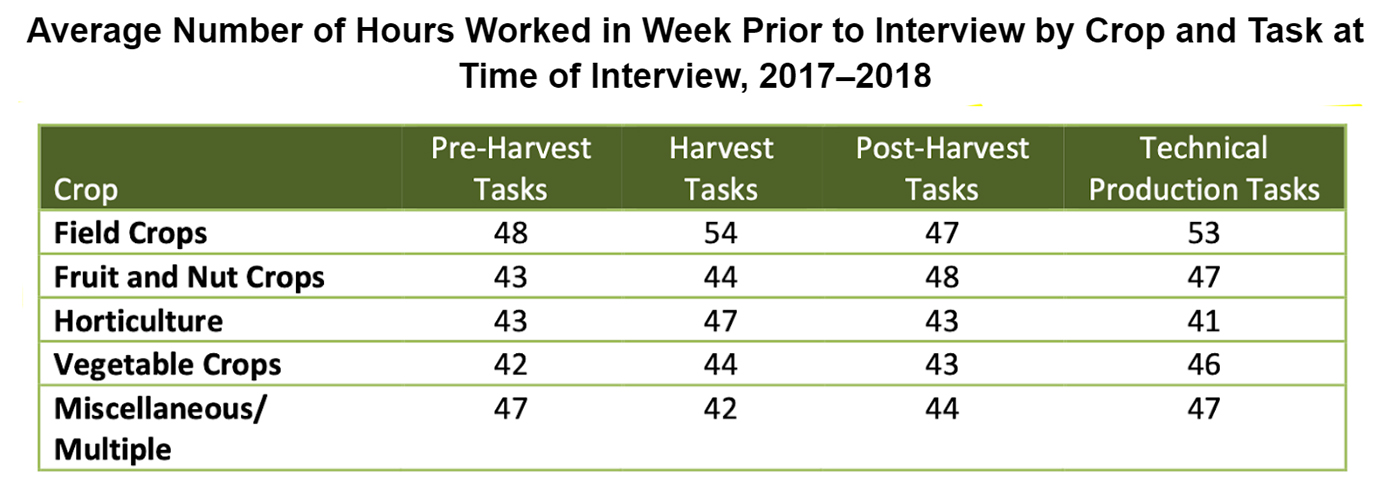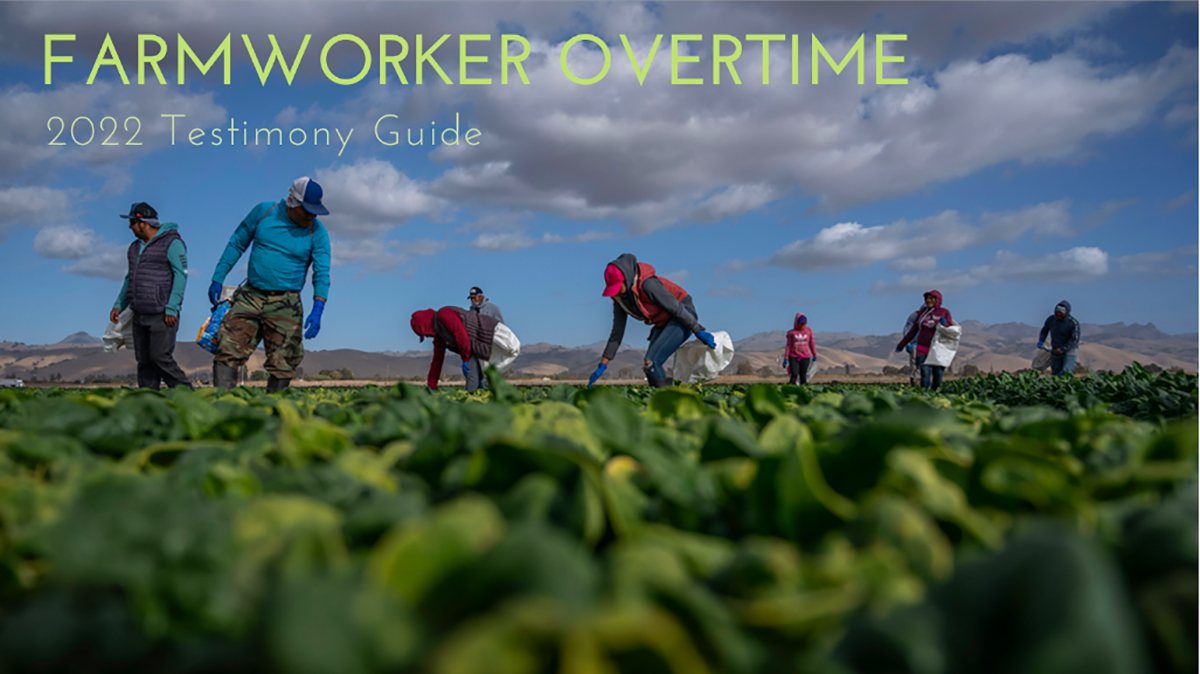Public Testimony for Farmworker Overtime
Farmworkers deserve fair pay!
Farmworkers have been excluded from minimum wage protections and overtime pay through the Fair Labor Standards Act of 1938 for too long.
Farmworkers already endure challenging lives and workplace conditions and are among the most vulnerable workers in our community. The vast majority of Oregon’s farmworkers risked their lives to migrate to the U.S and secure better work opportunities. Many of these migrant workers left their homeland, culture, and families behind in the process. Despite the long hours of work, exposure to dangerous pesticides, and harsh weather conditions, farmworkers still struggle to make ends meet. On average, migrant farmworkers earn between $17,500 to $19,999 a year. Farmworkers on average work 55-70 hours a week during peak season. (1)
Throughout the pandemic, catastrophic fires, and dangerous levels of air quality, farmworkers continue to work and ensure that people have food available. Now it’s our turn to stand together as a community and call for an end to the racist and exclusionary policies that fuel economic insecurities for Oregon farmworkers and their families.
There are over 86,240 farmworkers in Oregon that need our help. They are our friends, our neighbors, our community. Let’s stand in solidarity with our friends and neighbors and speak out against racial and social injustices!
According to an agricultural workers survey done between 2017 to 2018 (2) field crop workers reported the highest number of hours 48 for pre-harvest, 54 for harvest and 53 for technical tasks.
The table below represents the average number of hours worked prior to interview according to crop and task.

Working overtime without being properly compensated not only affects the farmworkers financially but also causes adverse health effects. Working overtime routinely increases the risk of work-related injuries due to fatigue, it contributes to the onset/ progression of chronic health conditions of heart disease and diabetes and has negative mental health outcomes of depression, anxiety and suicidal ideation. Working long hours not only affects their physical health but also their wellbeing and quality of life. Mandated overtime provides less time for family life, causes financial and logistical strain trying to maintain a functional household and childcare. (3)
The farmworker overtime bill has the potential of reducing pesticide exposure that has adverse effects on their health. Chronic exposure to organophosphates has been most frequently identified with decrease in neurobehavioral performance among farmworkers. (4, 5)
Throughout the pandemic, catastrophic fires, and dangerous levels of air quality, farmworkers continue to work and ensure that people have food available. Now it’s our turn to stand together as a community and call for an end to the racist and exclusionary policies that fuel economic insecurities for Oregon farmworkers and their families.
This proposed bill (HB 4002) not only supports farmworkers' rights but also has beneficial health outcomes relating to their health and well-being.
There are over 86,240 farmworkers in Oregon that need our help. They are our friends, our neighbors, our community. Let’s stand in solidarity with our friends and neighbors and speak out against racial and social injustices!
Allies and community members, come join us and share your testimony in support of Farmworker overtime! Support HB 4002!
Tell lawmakers we must pay farmworkers for every hour they work!

How to write your testimony for the Farmworker overtime bill
(HB 4002)
Not only is the process of writing a public testimony to legislators EASY, but it is a great way to make your voice heard and support important policies that impact all Oregonians. The Oregon 2022 Short Legislative Session will run from February 1st through March 6th and will provide many opportunities for public testimony about bills you may care about. This section will provide information about how to write a testimony, what to put in your testimony and when to submit your testimony.
Remember, Oregon legislators DO want to hear from you! Try to keep your testimony brief and to the point. Aim for one page typed (or less). As a member of the public, the most important thing you can share is your personal story and lived experiences. Make sure to introduce yourself, say why this legislation is important to you, then express that information in a personal story. Conclude your testimony by thanking your legislators for their service.
Too often, lobbyists, businesses, and organizations are the only people who give testimony. While it is important to hear from experts, YOUR personal experience and your expertise can make a difference in how bills get crafted into laws - or even if the proposal moves forward at all.
Farmworker Overtime Testimony TEMPLATE (PDF)
How to Submit Testimony Online (PDF)
For more information on writing a testimony, contact Meet Panchal, Environmental Justice Statewide Projects Manager, email: mpanchal@beyondtoxics.org
Reference
1 Totoian, D. S. J. (2021, November 18). Oregon farmworkers don’t get overtime pay. Some want to change that. Salem Statesman Journal. https://eu.statesmanjournal.com/story/news/2021/11/17/oregon-farmworkers-dont-get-overtime-pay-some-want-change/8621284002/
2 Findings from the national agricultural workers survey (NAWS) 2017–2018: A demographic and employment profile of united states farmworkers. (2021). https://www.dol.gov/sites/dolgov/files/ETA/naws/pdfs/NAWS%20Research%20Report%2014.pdf
3 Oregon Health and Science University. (2021). Mandated, but not compensated: Exploring the multifaceted impacts of overtime on farm workers’ health, safety, and well-being. https://img1.wsimg.com/blobby/go/c8357af7-9c3e-4b52-9725-4de56f1d3cea/PCUN_White%20Paper-Overtime%20Pay_FINAL.pdf
4 McCauley, L. A., Anger, W. K., Keifer, M., Langley, R., Robson, M. G., & Rohlman, D. (2006). Studying Health Outcomes in Farmworker Populations Exposed to Pesticides. Environmental Health Perspectives, 114(6), 953–960. https://doi.org/10.1289/ehp.8526
5 Muñoz-Quezada, M. T., Lucero, B. A., Iglesias, V. P., Muñoz, M. P., Cornejo, C. A., Achu, E., Baumert, B., Hanchey, A., Concha, C., Brito, A. M., & Villalobos, M. (2016). Chronic exposure to organophosphate (OP) pesticides and neuropsychological functioning in farm workers: a review. International Journal of Occupational and Environmental Health, 22(1), 68–79. https://doi.org/10.1080/10773525.2015.1123848








